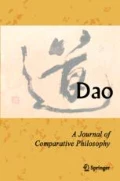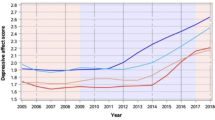Abstract
This article explores some of the ways in which historical writings can play a substantial role in the development of ethical sensibilities and makes the more general point that since human beings are unique in understanding themselves as historical beings and value how they and others appear in historical perspective, an understanding and sense of history must play a role in an adequate account of ethics. The main focus of the article is a description and analysis of the views of the Chinese philosopher Zhang Xuecheng 章學誠. After presenting an account of Zhang’s ideas concerning the relationship between history and ethics, I argue that versions of Zhang’s central claims still have the potential to make significant contributions to contemporary philosophy.
Similar content being viewed by others
References
Anscombe, G.E.M. (1981). The Collected Philosophical Papers of G.E.M. Anscombe. Volume 3. Oxford: Basil Blackwell.
Beasley, W. G. and E. G. Pulleyblank, eds. 1962. Historians of China and Japan. London: Oxford University Press.
Best, Geoffrey. 2001. Churchill: A Study in Greatness. New York: Hambleton and London.
Cohen, G. A. 2001. Karl Marx's Theory of History: A Defence. Revised Second Edition. Princeton, NJ: Princeton University Press.
Craig, Edward, ed. 1998. Routledge Encyclopedia of Philosophy. Volume 4. Routledge Press.
Etzioni, Amitai. 1996. The New Golden Rule: Community and Morality in a Democratic Society. New York: Basic Books.
Fang, Keli 方克立. 1986. 中國哲學史上的知行觀 (Knowledge and Action in the History of Chinese Philosophy). Beijing 北京: Renmin Chubanshe 人民出版社.
Freeman, Samuel R, ed. 1999. Collected Papers. Cambridge, MA: Harvard University Press.
Fussell, Paul. 1988. Thank God for the Atomic Bomb and Other Essays. New York: Summit Books.
Gray, J. Glen. 1959. The Warriors: Reflections on Men in Battle. New York: J. & J. Harper.
Ivanhoe, Philip J. 2002. Ethics in the Confucian Tradition: The Thought of Mengzi and Wang Yangming. Revised Second Edition. Indianapolis, IN: Hackett Publishing Company.
Louie, Kam. 1980. Critiques of Confucius in Contemporary China. St. Martin's Press.
Lu, Xiangshan 陸象山, Xiangshan quanji 象山全集 (The Complete Works of Lu Xiangshan). Sibubeiyao 四部備要 edition.
Newman, Robert P. 1995. Truman and the Hiroshima Cult. East Lansing, MI: Michigan State University Press.
NG, On-cho. 1993. “A Tension in Ch’ing Thought: ‘Historicism’ in Seventeenth- and Eighteenth-Century Chinese Thought.” Journal of the History of Ideas 54.4: 561-83.
Nivison, David S. 1966. The Life and Thought of C hang Hsüeh-ch’eng. Stanford, CA: Stanford University Press.
Peng, Guoxiang 龐國祥. 2003. 良知學的展開 : 王龍溪與中晚明的陽明學 (The Unfolding of the School of Pure Knowing: W ang Longxi and the Mid-Ming School of W ang Yangming). Taipei 臺北: Xuesheng Shuju 學生書局.
Shirokauer, Conrad. 1993. “Chu Hsi’s Sense of History.” In Ordering the World: Approaches to State and Society in Sung Dynasty China. Edited by Robert P. Hymes and Conrad Schirokauer. Berkeley, CA: University of California Press.
Tiwald, Justin. 2006. Acquiring “Feelings That Do Not Err.” PhD Dissertation. University of Chicago.
Tu, Weiming, and Mary Evelyn Tucker, eds. 1983. Confucian Spirituality. New York: The Crossroad Publishing Company.
Van Norden, Bryan W., ed. 1996. The Ways of Confucianism. La Salle, IL: Open Court Press.
_____, ed. 2002. Essays on the Analects of Confucius. New York: Oxford University Press.
Walzer, Michael. 2002. The Company of Critics: Social Criticism and Political Commitment in the Twentieth Century. New York: Basic Books.
Wilburn, Brad, ed. 2007. Moral Cultivation. Lanham, MD: Rowan and Littlefield.
Williams, Bernard. 1985. Ethics and the Limits of Philosophy. Cambridge, MA: Harvard University Press.
Wright, Arthur F., ed. 1953. Studies in Chinese Thought. Chicago: University of Chicago Press.
Yu, Yingshi 余英時. 1980. 論戴震與章學誠 (A Study of D ai Zhen and Z hang Xuecheng). Taibei 臺北: Huashi chubanshe.
Zhou, Qirong 周啟榮, and Liu Guangjing 劉廣京. 1984. “學術經世 : 章學誠之文史論與經世思想 (Ordering the World with Learning: Zhang Xuecheng’s Views on Literature and History and His Theory of Statecraft).” In 近世中國經世思想研討會論文集 (Proceedings of the Conference on the Theory of Statecraft of Modern China). Taipei 臺北: Institute of Modern History, Academia Sinica.
Author information
Authors and Affiliations
Corresponding author
Rights and permissions
About this article
Cite this article
Ivanhoe, P.J. Lessons From the Past: Zhang Xuecheng and the Ethical Dimensions of History. Dao 8, 189–203 (2009). https://doi.org/10.1007/s11712-009-9111-3
Published:
Issue Date:
DOI: https://doi.org/10.1007/s11712-009-9111-3




